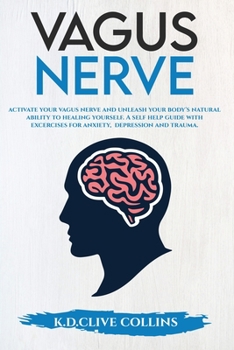Vagus Nerve
Do you want to learn how to activate your vagus nerve, unleash your body's natural ability to healing yourself?
If yes, then keep reading...
The vagus nerve is the longest cranial nerve in the body, reaching out from the brain stem as a pair of nerves, one for controlling each side of the body. It got its name from the Latin word for wanderer (vagus) because it wanders throughout the entire body. This is an apt description as the vagus nerve impacts in some way nearly every organ in the body. The vagus nerve is part of the body's parasympathetic nervous system. It provides you with the fight or flight instinct when presented with some sort of sudden, unexpected, or threatening situation.
As part of the parasympathetic portion of the autonomic nervous system, the vagus nerve acts as an inhibitor for the sympathetic system, providing a counterbalance to the initial panic from the sympathetic system, and allowing the body to calm down. The vagus nerve's motor functions extend to the medulla oblongata - where autonomic responses are regulated by the brain, while its sensory functions are directly tied to the cranial neural crest, where the body's facial muscles reside. This means the vagus nerve is informed and impacted by the very gestures of our face.
The vagus nerve is connected to the neuroception system of the body which helps us gather information to determine the safety of our environment on an unconscious level.
This book covers the following topics:
How can stress and anxiety affect your body and life?Inflammation, and what a stimulated vagus nerve can do about it
Self-help exercises for anxiety
Causes of anxiety, depression, and inflammation
Vagus nerve dysfunctional signalTrauma
Potential dysfunctions
Illnesses caused by stress
The polyvagal theory and PTSD
Power of your bodyBody and mind control connection
...And much more
Another aspect of the vagus nerve is that fully 80% of all the information is traveling from the organ systems up this nerve to the brain, while only the remaining 20% of its function involves information traveling down the nerve to the organs and lower systems. We usually think of the brain as being the originator of all information regarding our surroundings, but really it is the individual systems that begin the process, such as the eyes that see telling us what our surroundings look like, ears that hear telling us what sounds are nearby, the nose gathering in and reacting to scents constantly, and the taste buds on the tongue telling us what we need to know about the food we put in our mouth. Skin receptors tell us what the air feels like, what we are touching at the time, and many other things that we only pick up on a subconscious level.
The vagus nerve can be damaged by diabetes, upper respiratory viral infections, alcoholism, or through an accident during an operation. Stress, fatigue, anxiety, and even bad posture can also have a negative impact on the vagus nerve.





